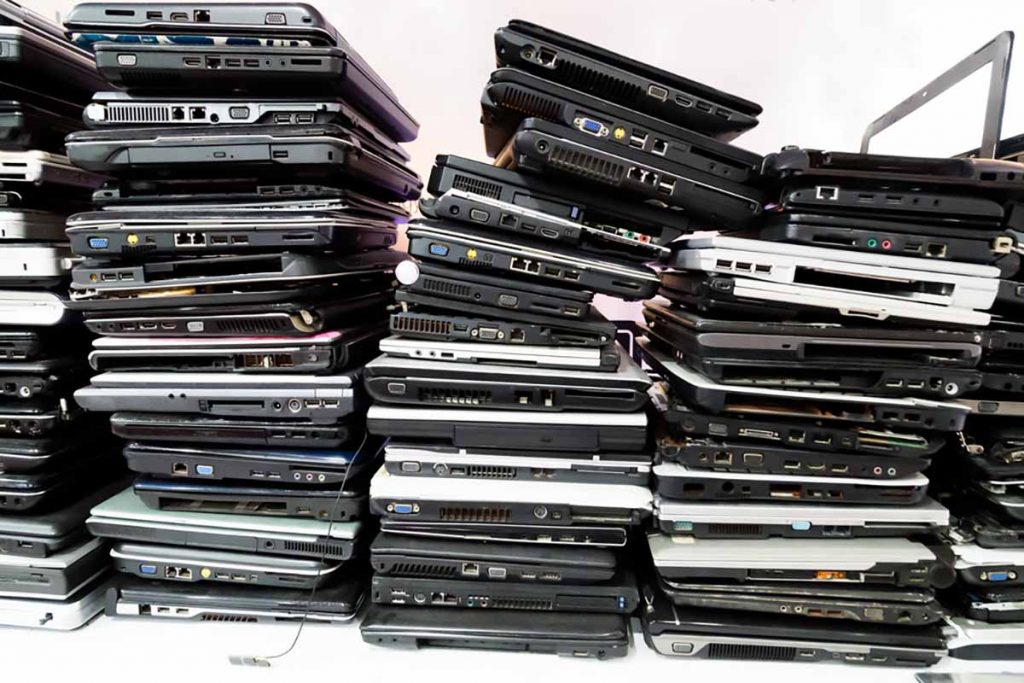
The author makes the case that out of all of the devices essential to remote working, laptops pose the biggest e-waste challenge. | ThamKC / Shutterstock
If you’ve been to a cafe in any major city pre-pandemic, with tables occupied by a sea of laptops, then you know that these devices were already essential. Now imagine laptop usage has only increased since 2020, with the pandemic-induced work-from-home lifestyle sending buyers into overdrive, creating laptop shortages that some claim will last into 2022.

Caroline Allman
Though laptops may be the heroes of the remote working world, what worries me as an ITAD professional is a future where those same laptops could become a recycling challenge. While we tend to take them for granted, laptops are a huge achievement in design and technological efficiency. However, in some cases, they can also combine all of the recycling pain points of monitors and desktop computers. With usage ramping up – either via individual purchases or supplied en masse by employers – it’s important to acknowledge the downsides and improve recycling processes to make sure that these much-needed tools don’t have diminishing returns.
A mixed blessing
Out of all of the devices essential to remote working, laptops pose the biggest e-waste challenge. Their pieces are smaller and the blend of the plastics within them changes often. Newer models have difficult-to-remove layers of components – plastic, LED light strips in the screen and thin batteries that are hard to remove safely because they can create a “thermal event” if damaged. It’s hard but necessary work – the internal components are higher end (with more precious metals), so recycling laptops is too rewarding to pass up.
And then there’s the data safety issues. Some units have solid-state drives (mSATAs) that are soldered onto the laptop motherboard. If the recycler doesn’t know this and fails to wipe the unit as a whole (instead of removing the drive from the unit to wipe it apart from the system) there’s a significant risk of data breach. Employer-supplied laptops can also have remote system controls or management software that, if not removed, can retain data and render an asset useless. Gone are the days when recyclers could just pull a hard drive out of the side of the unit, wipe it and be done.
Making a difference
With remote work likely sticking around post-pandemic, laptops aren’t going anywhere. So, the key is to look for ways to improve, tracking the devices and materials in tremendous detail to make sure recycled laptops and their data are accounted for. Doing this requires greater transparency and communication between original equipment manufacturers (OEMs), employers, employees, and ITAD partners to optimize recycling. All sides are already working hard, creating systems that can recycle more effectively, but there’s always areas to improve.
For example, maintaining a constant dialog about the impact of changing laptop materials would help curb negative impact. Using homogenous plastics in laptops makes recycling much easier. The same is true for use of magnesium, which is used in laptop cases, is lightweight and so far seems to be recyclable through normal streams.
At the same time, there should be discussions about design considerations – like modularity, where parts can be popped out more easily and replaced instead of requiring a whole unit to be torn down to access a battery or SSD. Not to mention the increasing use of magnets in laptops. Some have small, strong magnets to help them close (or with tablet-style laptops to help the keyboards attach). While recyclable in some cases, those magnets can be a problem for metal processors to handle if they are not disclosed because they jam systems and shredders. As insights and approaches like these are communicated through the chain and addressed, they can greatly affect how laptops are built and how easily they can be recycled.
Better tracking and communication would also improve data safety, making sure laptops are shipped to recyclers securely and that data is correctly destroyed. Many companies have realized this and have come up with better ways to track their corporate equipment and manage their return – a capability originally developed to ensure COVID safety. They’re also either developing internal policies for data security to make sure their recycling vendors know exactly what to do with their specific units (in cases where they use remote management software) or just using certified companies that can ensure the data is destroyed.
As we continue to see a marked increase in laptops returned from our clients, these steps show a commitment to investing in change and that things are already improving. With some collaboration, visibility and transparency, we can all work toward a world of remote work that doesn’t put our environment and data at risk.
Caroline Allman is the compliance officer for Apto Solutions.
The views and opinions expressed are those of the author and do not imply endorsement by Resource Recycling, Inc. If you have a subject you wish to cover in an op-ed, please send a short proposal to [email protected] for consideration.


![ARC-Banner-300x250[1][4][3].jpg Midwest Copier Exchange - An ARCOA Group Company](https://resource-recycling.com/e-scrap/wp-content/uploads/sites/2/2021/07/ARCOA-Banner-ESN-07-19-21.jpg)
